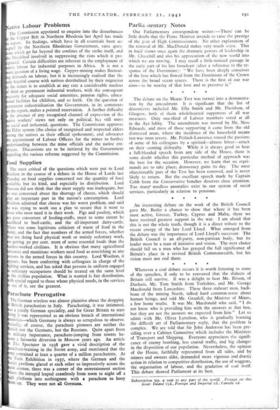ood Supplies
The most critical of the questions which were put to Lord oolton in the course of a debate in the House of Lords last uesday on food supplies concerned not the quantity of food milable, but its kind, and especially its distribution. Lord awson did not think that the meat supply was inadequate, but was concerned about the shortage of cheese, which should ay an important part in the nation's consumption. Lord oolton admitted that cheese was his worst problem, and said e was trying to work out a plan to secure that it went to ose who most need it in their work. Pigs and poultry, which e poor converters of feeding-stuffs, must to some extent be crificed to beef-cattle, and the all-important dairy-cattle. here was some legitimate criticism of waste of food in the rmy, and the fact that numbers of the armed forces, whether ey are doing hard physical work or mainly sedentary work, e getting so per cent. more of some essential foods than the rdest-worked civilians. It is obvious that many agricultural bourers and munitions workers need food as nourishing as any sons in the armed forces in this country. Lord Woolton, it ppears, has been conferring with colleagues in charge of the ghting services, and has asked that persons in uniform engaged sedentary occupations should be treated on the same level the civilian population. What is wanted is fair distribution, ith special regard to those whose physical needs, in the services out of it, are the greatest.






























 Previous page
Previous page